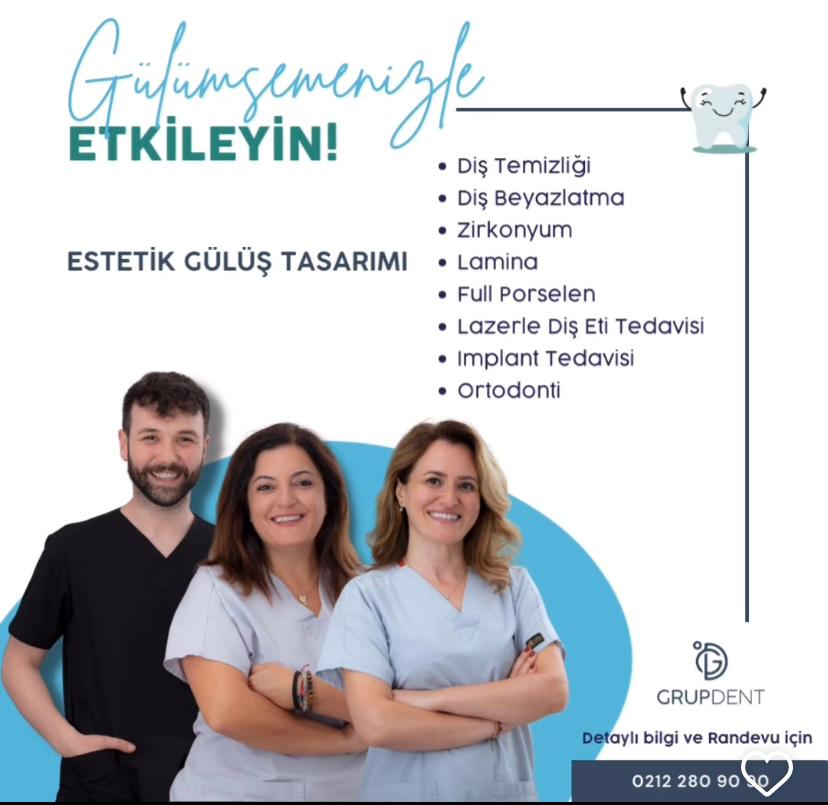
We want to know people who benefit the whole (the world). All people in the world need inspiration, science, kindness, and reminders that beauty is possible. In ARTTMODERNMIAMI GAZETTE, we reach people who are proud and inspiring. We want to know and introduce people who will inspire us with their success and courage.
ARTTMODERNMIAMI NEWSPAPER: Who is Ivet Acu Guney?
Ivet Acu GUNEY: I am an instructor chef, a researcher of world Jewish food culture and Sephardic food history, and the founder of Las Manos Cooking Class.
ARTTMODERNMIAMI NEWSPAPER: Where do you live?
Ivet Acu GUNEY: I have been living in Stockholm for 8 years. I have 2 sons, 12-year-old San Erez and 7-year-old Roy.
ARTTMODERNMIAMI NEWSPAPER: We have heard that you are a well-known name in Sephardic Cuisine. Can you tell our readers about Sephardic cuisine?
Ivet Acu GUNEY: Sephardic Cuisine is an ancient cuisine inherited from the mothers of the Jews who were forced to emigrate to the Mediterranean countries as a result of the Inquisition Courts held in Spain in 1492, is a culinary culture with many recipes that have managed to survive to the present day.
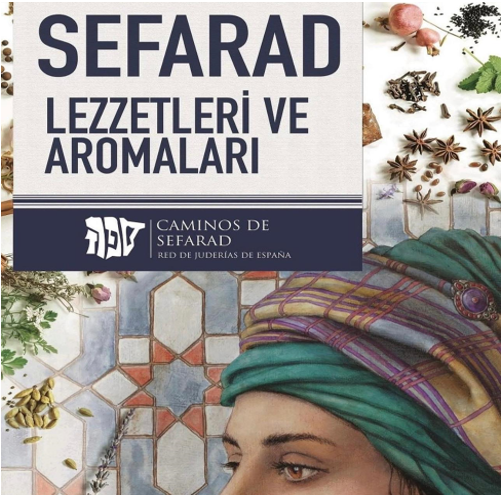
ARTTMODERNMIAMI NEWSPAPER: Let’s expand on the subject: What is Sephardic? Can you give us brief information about Sephardic Jews? How do you keep Sephardic culture alive?
Ivet Acu GUNEY: “Sephardi” means “Spain” in Hebrew and historically refers to Jews who lived in Spain and Portugal. Exiled from Spain in 1492 and Portugal in 1497, these Jews settled in the Ottoman Empire, North Africa, the Balkans, and the Middle East. Today, Sephardic Jews historically describe Jewish communities with this cultural origin.
Brief information about Sephardic Jews:
Sephardic Jews are a community that speaks a Spanish-based language called Ladino (Judeo-Spanish) and has been heavily influenced by Spanish culture. Their religious rituals and traditions differ from Ashkenazi Jews; for example, their prayer books and music are influenced by Andalusia. Sephardic Jews who settled in the Ottoman geography played an important cultural and commercial role in this region.

ARTTMODERNMIAMI NEWSPAPER: How do you keep Sephardic culture alive?
Ivet Acu GUNEY: Sephardic culture is kept alive with traditions, Ladino songs, recipes, and religious rituals. Today, Sephardic heritage is continued with religious ceremonies held in synagogues, cultural events, music works in Ladino, and the preservation of food culture. In addition, various organizations and associations organize conferences, exhibitions, and workshops to promote Sephardic history and traditions. In addition, I have started to set tables all over the world with my GRANDMOTHER’S recipes, both Sephardic Gastronomy and the stories of this journey, and I am sure that we will get to know each other better and pass them on to future generations.
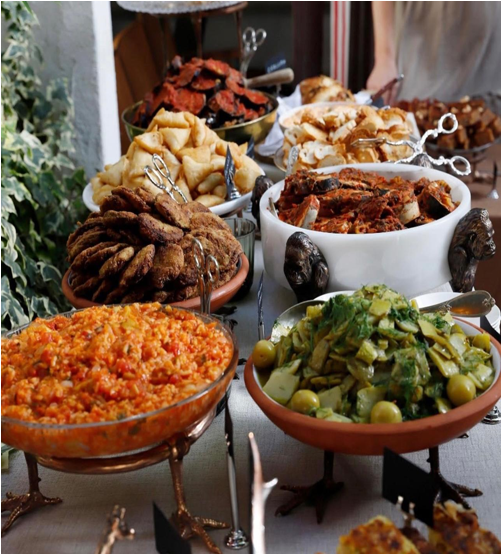
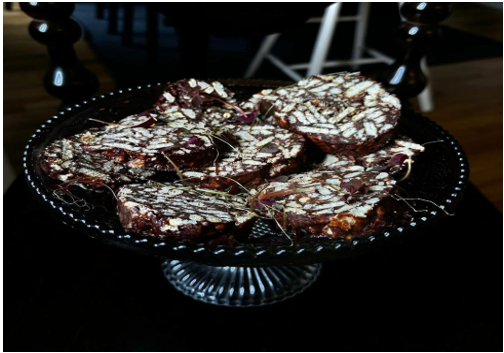

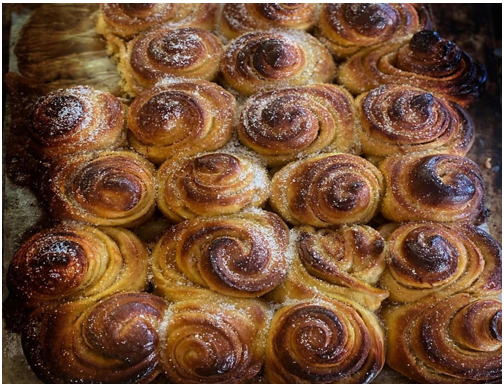
ARTTMODERNMIAMI NEWSPAPER: What is a must for the Sephardic menu? Can we get a recipe?
Ivet Acu GUNEY: It is the most difficult question to ask me. Nir Cuisine is a dish in which vegetables and green colors are predominant, and it is a poor cuisine with few ingredients but very delicious results.
Kashkarikas: Pumpkin Peel Dish
Ravikos: Spinach Root Dish
Borekitas of Berenjena
Tapada, Frojalda
Frankie Yenas
Almodrote (A kind of pastry made with zucchini)
Cufletikos (Stuffed Leeks)
Gaya Kon Avramila (Weasel fish)
Mustacudos (Walnut Dessert)
Halva De Semola (semolina dessert)
ARTTMODERNMIAMI NEWSPAPER: We heard that you have received awards in your field. You are involved in many projects; can you tell us a little about your projects? How do we organize international banquets?
Ivet Acu GUNEY: When I started this journey, I aimed to start with Turkey. The first stop was Edirne. Then we set up many tables in Istanbul. I began to have many invitations for Sephardic dishes in the country where I live. Companies started to be interested in Sephardic cuisine and its stories. With Cucina 75 Esra Duzdag and my chef friend Deniz Barin, we began writing healthy projects and set up workshops and tables in Turkey and worldwide. We just came from London, now we will continue with Portugal and Germany, then Turkey.
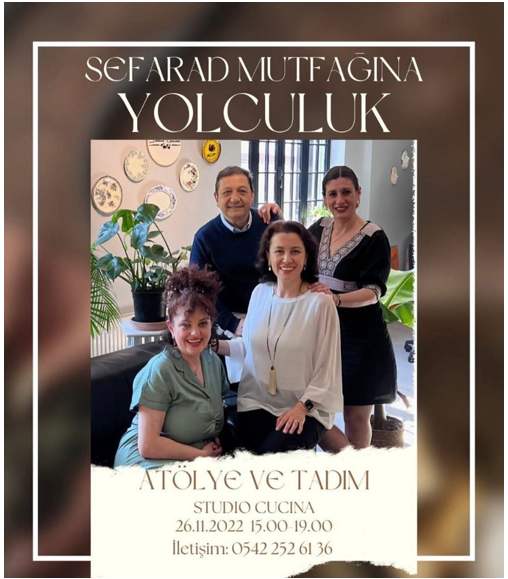
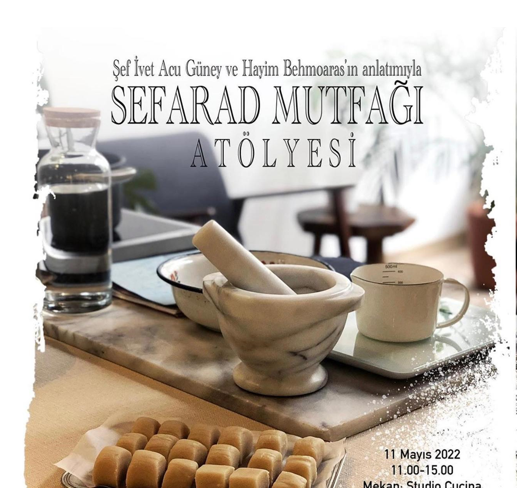
ARTTMODERNMIAMI NEWSPAPER: Would you consider establishing a “Sefarad Sofrası” in Miami?
Ivet Acu GUNEY: I would like that very much because it is a city where many Sephardim live. In fact, at our invitations, there is usually more of the wider community…
ARTTMODERNMIAMI NEWSPAPER: Have you received any culinary training, or is Sephardic Cuisine passed down from family to family as a culture?
Ivet Acu GUNEY: I received culinary education. But in the Sephardic kitchen, I am still my GRANDMOTHER’S assistant. This is something else, a cuisine that is immoderate but has rules. A legacy of Ken Dinc’s techniques, where the taste of the hand is transferred to the food as you make it over time…
ARTTMODERNMIAMI NEWSPAPER: I’m sure, you’ve made many sacrifices to get where you are. Can you share a few of them?
Ivet Acu GUNEY: Of course. There were times when I was separated from the children due to travel, and there still are.
Finding sources is not easy. It is important to read a lot and research. It requires spending a lot of time and effort.
ARTTMODERNMIAMI NEWSPAPER: Last question… 😊 How does İvet Acu Güney spend 24 hours?
Ivet Acu GUNEY: I start the day early. I don’t like to sleep much. After the children’s preparation for school, routine catering work and workshop work. I write recipes every day, it doesn’t matter if they are new or old, I read a lot of recipes. I like walking and sports. Generally, I like to have a quiet day.
ARTTMODERNMIAMI NEWSPAPER: We greatly thank dear Ivet and wish her continued success.


WHO IS IVET ACU GUNEY?
Instructor chef, researcher of world Jewish food culture and Sephardic food history, and founder of Las Manos Cooking Class. Born in Moda, Istanbul, I grew up in Kuzguncuk.
She worked as a senior executive assistant and brand management in companies such as Eczacıbaşı Holding and Sabancı Holding.
As the grandchild of a family that came to the Ottoman Empire from Spain in 1492, she reinforced her interest in cuisine with cooking training.
She received training in world cuisine at Istanbul USLA Academy, Italy Milan Cook and Dine Academy, and Stockholm Culinary SFI.
After settling in Stockholm, Sweden in 2016, she continued her career in the kitchen.
Las Manos Cooking Class, which she opened in 2020, was the first cooking workshop opened by a Turkish entrepreneur in Sweden. Las Manos continues to prepare Turkish, and Sephardic cuisines, world cuisine workshops, and seminars.
It collaborates with institutions and brands such as Trattoria Grazie, Habajit Stockholm Catering, and Sizzle Food. Thanks to the work that started with Sizzle Food & Beverage, Turkish food is now available in chain stores in Stockholm.
She explained healthy, waste-free, olive oil-based Turkish delicacies practically at the events organized by the Swedish Embassy within the scope of Turkish Cuisine Week.
She continues her work on Sephardic Cuisine and culture in Turkey under the roof of the CucinaNo75 Gastronomy Experience Platform.
Mother of two children, Ivet Acu Guney speaks Turkish, English, Spanish, and Swedish.

